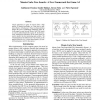142
click to vote
AIIDE
2008
15 years 4 months ago
2008
Classic approaches to game AI require either a high quality of domain knowledge, or a long time to generate effective AI behaviour. These two characteristics hamper the goal of es...
140
click to vote
AIIDE
2008
15 years 4 months ago
2008
In this paper we describe a system called ViGLS (Visualization of Game Log Summaries) that generates summaries of gameplay sessions from game logs. ViGLS automatically produces vi...
134
click to vote
AIIDE
2008
15 years 4 months ago
2008
Human experience with interactive games will be enhanced if the software agents that play the game learn from their failures. Techniques such as reinforcement learning provide one...
138
click to vote
AIIDE
2008
15 years 4 months ago
2008
The quality of AI opponents often leaves a lot to be desired, which poses many attractive challenges for AI researchers. In this respect, Turn-based Strategy (TBS) games are of pa...
132
click to vote
AIIDE
2008
15 years 4 months ago
2008
Emergent narrative refers to simulation-based systems in which stories emerge from the autonomous interactions among character agents and/or the human player. Despite its advantag...
114
click to vote
AIIDE
2008
15 years 4 months ago
2008
Game developers are faced with the difficult task of creating non-player characters with convincing behavior. This commonly involves an exhaustive specification of their actions i...
121
click to vote
AIIDE
2008
15 years 4 months ago
2008
Tactical Agent Personality (TAP) is a modeling concept to capture tactical patterns in game agents, based on a personality concept introduced by Tan and Cheng (2007), to allow beh...
121
click to vote
AIIDE
2008
15 years 4 months ago
2008
Culture and emotions have a profound impact on human behavior. Consequently, high-fidelity simulated interactive environments (e.g., trainers and computer games) that involve virt...
106
click to vote
AIIDE
2008
15 years 4 months ago
2008
Building credible Non-Playing Characters (NPCs) in games requires not only to enhance the graphic animation but also the behavioral model. This paper tackles the problem of the dy...
AIIDE
2008
15 years 4 months ago
2008



